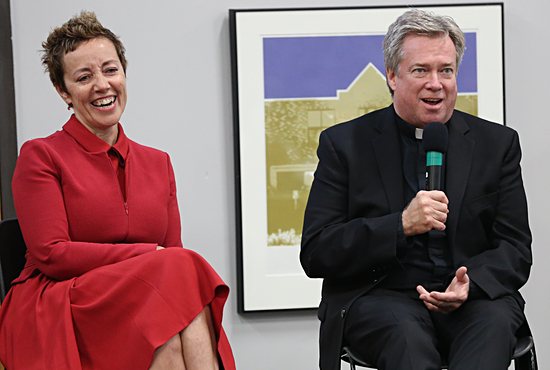
Catholic schools’ combination of quality education and faith formation brings value to students, parishes and the wider community, but financial and social barriers to Catholic education remain for some families, including a growing Latino population, experts noted at a June 25 forum on education sponsored by the Catholic Community Foundation of Minnesota.
While Catholic schools foster growth in parishes and greater safety in their surrounding communities, the schools, in turn, depend on those institutions for support, six local and national experts said.
“The ‘value proposition’ is to break down barriers to allow those families to live a full spirituality that has then all the educational benefits, but, more importantly, has all the faith benefits that reinforce the cultural predispositions of the family,” said Luis Fraga, director of the Institute for Latino Studies at the University of Notre Dame.
Titled “Why Are Catholic Schools Essential for a Strong Church and Community?” the forum was held at Cretin-Derham Hall high school in St. Paul and drew 90 pastors, donors, school administrators, educators and community leaders. It was part of CCF’s ongoing “Giving Insights” series, which explores the impact of Catholic philanthropy on the community.
The discussion was organized to inform the community and inspire donors, many of whom have expressed a desire to pass on blessings they’ve received from a Catholic education, said Anne Cullen Miller, president of the St. Paul-based foundation, which financially supports spiritual, educational and social endeavors of the Catholic community.
“We’ve learned a lot about how important it is to come to the table as community, that the foundation can’t do it alone, the archbishop can’t do it alone, the principal can’t do it alone, and the pastor and lay Catholics can’t do it alone, but when we come together in community we can do a lot,” she said.
In the Archdiocese of St. Paul and Minneapolis, more than 29,000 students attended 91 Catholic elementary and secondary schools during the 2018-19 school year. Nationwide, 1.8 million children attended Catholic schools, according to the National Catholic Educational Foundation.
Catholic schools provide the kind of structure and support that establish the “social capital” that students struggling academically need, said Nicole Stelle Garnett, senior policy adviser at the University of Notre Dame’s Alliance for Catholic Education. That social capital consists of overlapping circles of trust among principal, teachers, parents and students, which act like glue, binding the school community together, she said.
Catholic schools also benefit the wider community, Garnett said, pointing to her research showing that when Catholic schools closed in some urban neighborhoods, crime increased as much as 33 percent.
“Definitely the Catholic school closures caused neighborhoods to socially disintegrate,” she said.
Around the country, changing demographics and the fact that nearly 40 percent of U.S. Catholics are Latino underscore the need for Catholic schools to reach out to diverse communities, Fraga said. In addition to financial considerations, Latino Catholics might lack information about what the schools offer, or feel they are not welcome, he said. Other Latino parents with children in the school are sometimes the best ones to help increase understanding, he said.
Word-of-mouth is also helpful in reaching parents whose children attend public schools or “nones” who don’t practice a faith, panelists said. “I think that it’s a great opportunity for us to connect with these young parents and these young children, bring them not only back into our schools, but bring them back to their home parish,” said Gail Dorn, president of the Catholic Schools Center of Excellence in Edina, which supports archdiocesan elementary schools.
Parish recruitment programs can help families see the value of Catholic schools, but sometimes it works in reverse, one participant said. “It used to be that the children would come to our schools through the parish, but now our schools are of themselves in active evangelization,” said Dominican Sister John Mary Fleming, education director of the Dominican Sisters of St. Cecilia in Nashville, Tennessee, who moderated the panel.
Steve Karel, 61, a school board member of St. Pascal Regional Catholic School in St. Paul, attended the forum and said he was concerned about the increasing demand for school financial aid.
“That’s a real concern in terms of how do we not just get people to come, but even help them to afford Catholic school?” said Karel, a member of Assumption in St. Paul.
Sara Harwood, 42, a CCF donor and mother of two children who attend St. John the Baptist Catholic Montessori School in Excelsior, asked how she and other parents can use their skills to help promote Catholic schools, suggesting the answer might be found in “inviting pastors and principals to ask for that help and reach out and get to know their families and then put us to work.”
The story of Catholic education’s “value proposition” should be told, said Jean Houghton, president of the St. Paul-based Aim Higher Foundation, which provides tuition assistance for children attending archdiocesan elementary schools. “It’s OK to tell our story,” she said. “It’s OK to say the impact we’re having out there.”
The effect can be far reaching, said panelist Father Kevin Finnegan, pastor of Our Lady of Grace parish and school in Edina and chaplain of St. John Paul II Catholic School in Minneapolis. “When you have a Catholic way of learning, that can impact how you are in the ‘real world,’” he said. “We want to raise a society that’s holy, and a society that’s holy loves its neighbors.”



